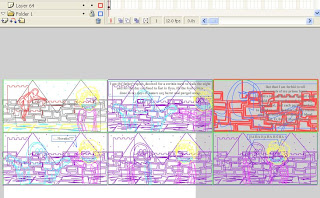Ghost:
I am thy father's spirit,
Doomed for a certain term to walk the night
And for the day confined to fast in fires,
Till the foul crimes done in my days of nature
Are burnt and purged away. But that I am forbid
To tell the secrets of my prison house,
I could a tale unfold whose lightest word
Would harrow up thy soul, freeze thy young blood,
Make thy two eyes, like stars, start from their spheres,
Thy knotted and combinèd locks to part
And each particular hair to stand on end,
Like quills upon the fearful porpentine.
But this eternal blazon must not be
To ears of flesh and blood. List, list, O, list!
If thou didst ever thy dear father love—
Hamlet:
O God!
Ghost:
Revenge his foul and most unnatural murder.
--------------------
In these lines the ghost introduces itself to Hamlet as the spirit of his father (shocks Hamlet) and then asks for his son's commitment to revenge his murder. Once Hamlet accepts the call (text not given above), the ghost remarks:
Duller shouldst thou be than the fat weed
That roots itself in ease on Lethe wharf,
Wouldst thou not stir in this.
Essentially saying something is would be wrong with Hamlet if he didn't get riled up about the situation, and the presence of his father's apparition.
-------------------------
The fact that the ghost is seen by the guards, and then Horatio -- who is said to be scholarly -- is enough to convince Hamlet of the apparition's existence. When the ghost is directly introduced to the reader as it speaks to Hamlet (we hear it with him), the existence of apparitions are validated within the world of the play, and possibly implied by Shakespeare in his own world. However, in modern times many are skeptic of whether ghosts exist ( I don't believe in them) . . . so what would happen if the most characteristic figure of the play (in the sense that Hamlet is one of the most notorious ghost stories) -- the one who sets the 'call', and starts the action -- doesn't actually exists? To answer that question, there would be no play -- and to a degree, there lies the joke of the third strip, where I have Horatio dress up as King Hamlet's Ghost as a joke (invalidating the existence of ghosts). The fact that it is a prank between best friends, over the serious conflict of the actual play (murdered father), heightens the punchline.
=============================
Process
The line work for this comic only took 64 layers to complete -- a significantly less amount than the other two, since my familiarity with the program increases with each comic I make. At this point, the style seems to have [fully] developed (you can see that the first comic looks a little different than the others).

Some choices I made:
- Elsinore Castle was modeled after the ghost scene in Mel Gibson's Hamlet
- some lines from the ghost's dialogue had to be cut, in order to neatly fit in the frame
- first comic where I added new text (necessary for the punchline)
- Horatio is the one under the white sheet, as the joke contradicts his "scholarly" nature
- The ghost is originally cut off after he says "If thou didst ever thy dear father love—" by Hamlet saying "O God." I keep the same break, but replace it with Hamlet asking the ghost if it is Horatio dressed up.
No comments:
Post a Comment